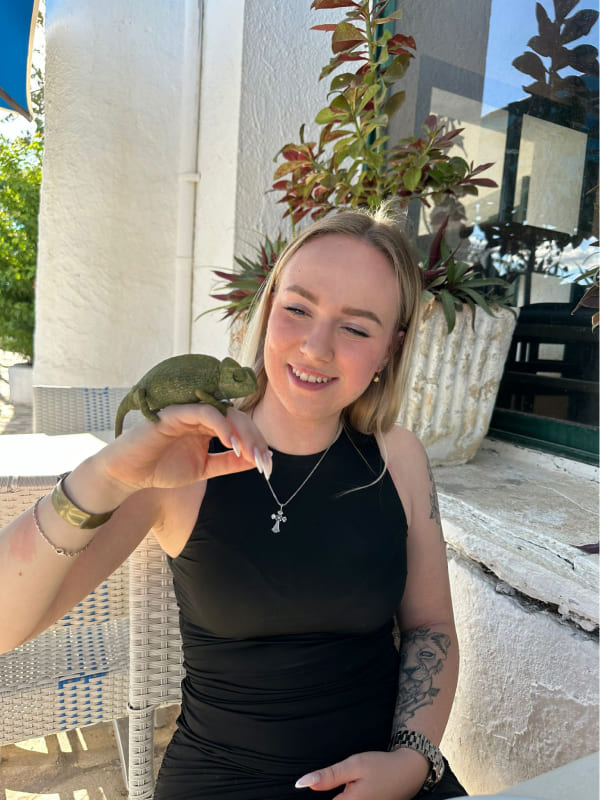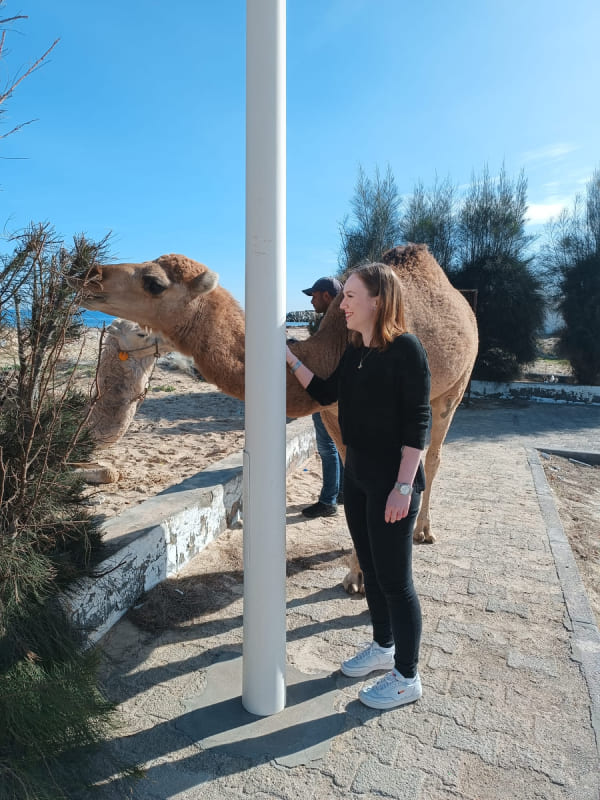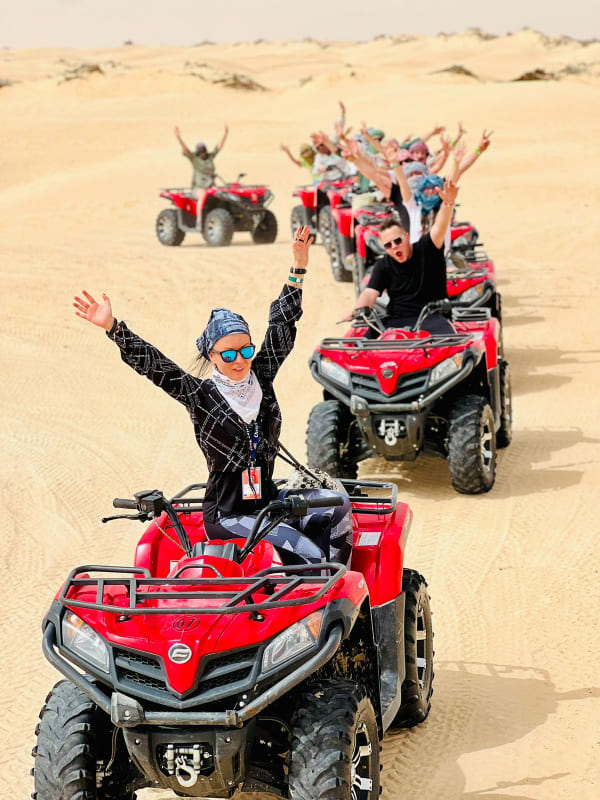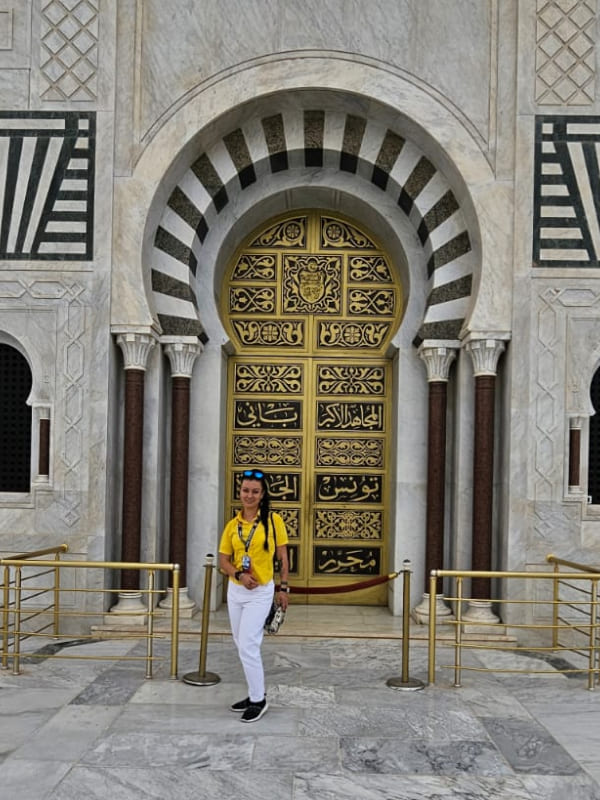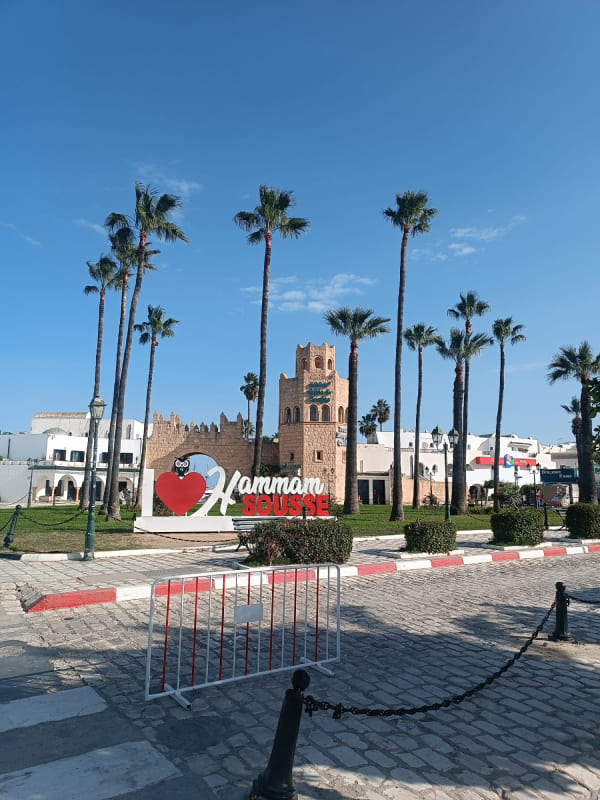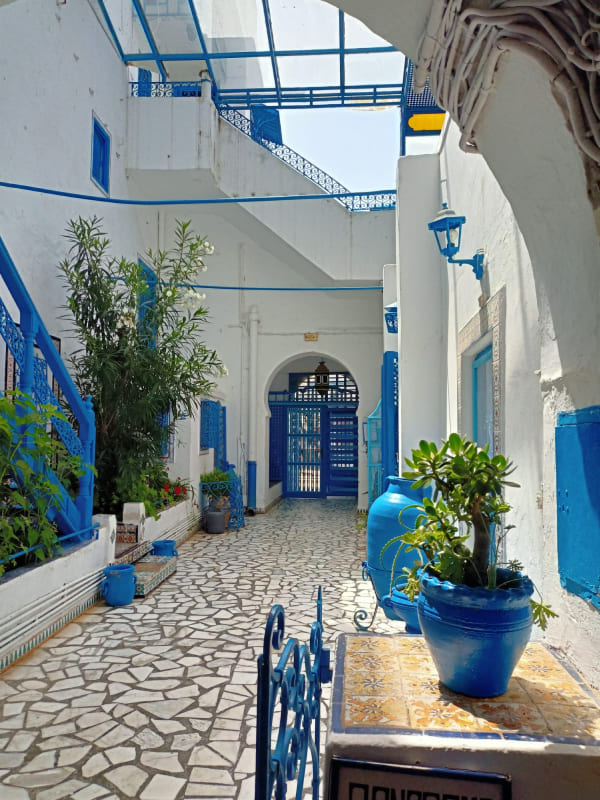«Employee Happiness Index» at CG: Another Perspective. Part III
We started the discussion on the topic of the «Happiness Index» of Carthage Group employees in the first and second publications of our small interviews. We talked about what working at Carthage Group looks like from the inside, how our teammates were welcomed in Tunisia and much more.
Why is the internal state and sense of well-being of our colleagues is so important that it has become the reason for such an extensive and detailed discussion?
It’s very simple. In order to share positive energy with tourists, tourism industry professionals need to draw that energy from somewhere. Only happy people can share happiness! And only those who have sunshine in their hearts, rather than gloomy clouds, can provide guests with magical experiences from their travels.
So, what does our corporate «Happiness Index» show? Here are three more opinions from Carthage Group employees, that will conclude our discussion.
Jagoda Chrost: «I work, but the sun, sea, and palm trees allow me to constantly feel like I’m on vacation»
What country are you from? How did you end up working in the tourism industry?
I am from Poland. After finishing high school, I didn’t know what I wanted to do in life, so I was searching for my career path. At the same time, traveling was my passion, and I decided to combine it with work. For example, being a resident is a great idea for mixing business with pleasure. Especially since I am fluent in two languages, Polish and English, which is one of the important requirements for applicants for this position.
I looked around, chose and sent my resume to various companies. And that’s how I ended up at Carthage Group in Tunisia.
How did this Muslim country welcome you, a European resident?
Many people imagine the Muslim world as quite complicated and dangerous. But if we talk specifically about Tunisia, I feel very comfortable here. The local customs, festivals and even the way of life are simply wonderful!
Arab culture is incredibly interesting. It captivates and intrigues. And women who cover themselves in accordance with their religion command my great respect, I admire them.
It’s wonderful that Tunisia has resonated with you!
Yes. There is another detail: in general, Tunisians live peacefully, without haste. They have enough time for everything, and they are in no rush. Although sometimes this can be frustrating if something is not done on time. But there are also many advantages.
I also cannot help but mention the unity of Tunisian society, which I consider to be very, very valuable. People here are always ready to help each other, and there is a sense of a united nation.
Having spent a few months here, I have learned a bit of Arabic. Specifically, the Tunisian dialect of Arabic. However, I currently understand more than I can express in words, but communicating with the locals is becoming easier and easier. This makes life here even more enjoyable.
By the way, I can note that the Tunisian dialect sounds very emotional. It’s funny, but sometimes it can be difficult to tell whether someone is arguing with someone else, having a regular conversation, or sharing joy.
/photos from Jagoda Chrost personal archive/
Have you made any friends here?
Tunisians welcomed me very well. From the very beginning, I didn’t feel alienated or unwelcome, and I never felt afraid when I went out alone, even if it happened at night.
I have made many friends here, and I hope they will stay with me for a long time.
What duties do you perform as a resident?
There are many extremely important responsibilities. I am in charge of the tourists, their health and well-being. And for much of how their vacation will go by, starting with the greeting at the airport.
I organize meetings at the hotels to tell our guests about Tunisia and to assist with any issues that may arise at the hotel (if any do arise). I answer all sorts of questions and share information about the most interesting excursions that are worth visiting.
Are you very busy? How is your work schedule organized?
Working as a resident means being on duty 24/7. Sometimes it’s hard to find a moment for myself.
I go to the airport to say goodbye to departing tourists and welcome new guests twice a week. Three days a week I hold information meetings, usually starting this work at 9 AM and finishing only at 7 PM, and during the peak season even at 8 PM. However, this isn’t always like that. On some days I finish around 3 PM.
I am constantly talking on the phone. Literally all the time. Tourists write and call me with all sorts of questions, mostly to seek advice, but there are also other calls, for example, when guests need medical assistance – and then I immediately arrange a doctor’s visit to the hotel.
I have two days off a week. But in reality, the nature of the job is that it’s impossible to distance myself from it. My mind never rests.
How did the Carthage Group team welcome you? How do you like working in our company and in its international team?
I feel valued at Carthage Group. Issues related to my employment are addressed thoroughly and carefully. All necessary documents are in order, and I don’t have to worry about anything. Company has everything under control.
My employer takes care of paying for rent, water, gas, electricity and food. I don’t have to pay for anything. It’s really great, and I can save a lot of money. I spend my salary on entertainment and some part on taxi if the monthly amount provided by the company is not enough.
And my colleagues are wonderful! From the very beginning, when I arrived in Tunisia for work, I felt that I was being taken care of. Whenever I didn’t know something, my questions were answered immediately, and when I needed help, for example, to get somewhere urgently, there was always someone who offered to give me a ride. No matter what happens, I could always count on their support.
Working in an international team has made me more open-minded. My English has definitely improved. Additionally, I have gained a different perspective on the world. People come from various countries, and we can share our life experiences, compare our challenges, and reflect. It is a very enriching process!
What makes me especially happy is that our connection with some of my colleagues goes beyond work. In Tunisia, at Carthage Group, I found true friends.
How do you spend your free time here?
Sometimes I go to the beach to relax, swim and sunbathe. Even though I work, the sun, sea and palm trees allow me to constantly feel like I’m on vacation here.
In the evenings, I meet up with friends, and colleagues from work. We might stop by a bar to chat, laugh and grab a bite to eat.
I also really enjoy walking, and in my free time, I often visit the medina, where I do some shopping.
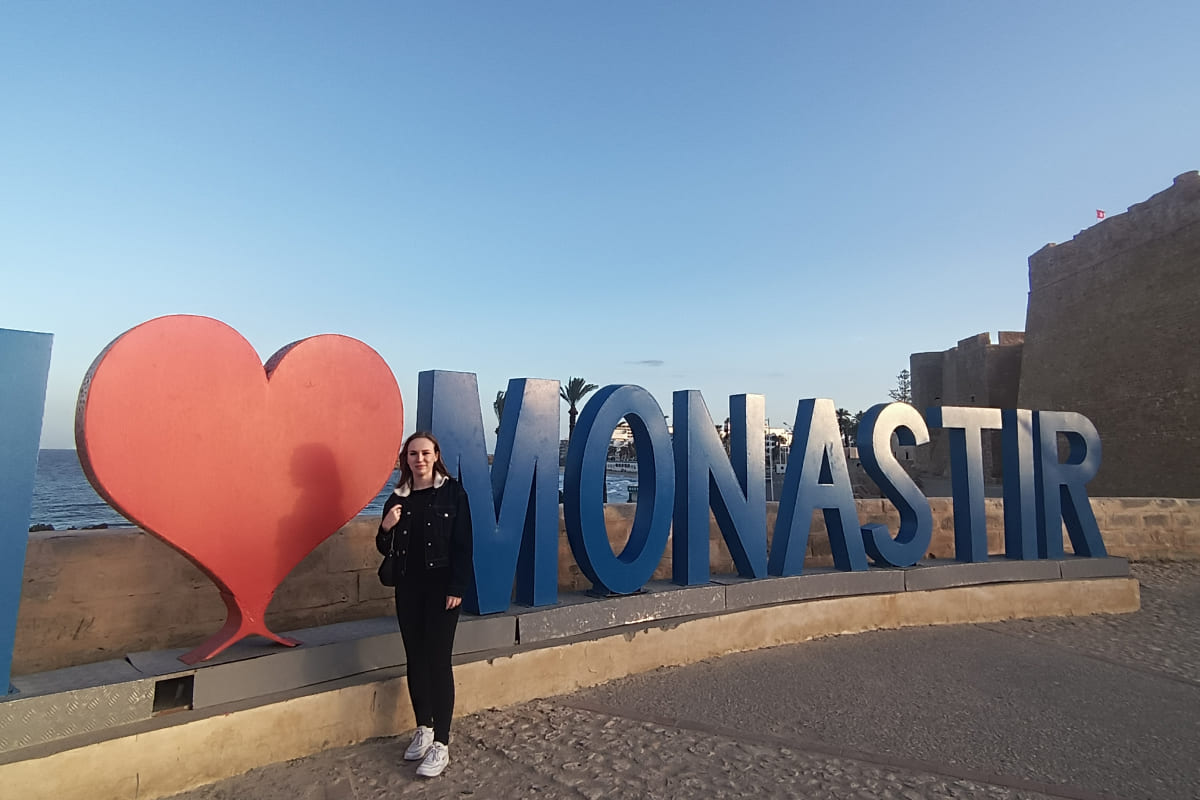
/photo from Jagoda Chrost personal archive/
What places in Tunisia would you recommend tourists to visit? Do you have your personal list of «must see» tourist spots?
I really like Sidi Bou Said. It is the most beautiful town in Tunisia. All the houses there are white and blue, similar to the Greek Santorini. That’s why I consider the «3 Capitals» tour (Carthage – Sidi Bou Said – Tunis) a must-do activity, during which you can visit this charming place. You will get to learn about the history of Carthage and make a visit to the capital of Tunisia. I think everyone should go on such an excursion.
Unfortunately, I haven’t been able to visit the Sahara yet. However, judging by the enthusiasm of tourists after their trip, I think it must be truly amazing. Space city from «Star Wars,» the salt lake, sunrise in the desert, an oasis and much more unforgettable experiences that will stay in your memory forever. El Djem is also a must-visit place while being on vacation in Tunisia for anyone who watched the movie «Gladiator».
And one more question. Expectations vs. reality. Is working in Tunisia, at Carthage Group what you dreamed of and wanted?
At first, when I just started working in Tunisia, I experienced a bit of stress. Although I was already familiar with the country, I had only visited for vacations, for a couple of weeks. But this time, it was truly a long-term move.
And everything turned out better than I expected! Now Tunisia is my second home.
Thanks to the support of my colleagues, adapting to the new conditions has been easy for me. It seems that I am handling everything wonderfully. I feel in my element and I didn’t expect to feel so comfortable.
To be honest, thanks to this job, I’m considering living here longer because I’ve experienced Tunisia from the inside and fallen in love with it.
Andrea Aleksandra Nica: «It is a great honor to be part of an international team of professionals of such excellence!»
Where are you from? What is your degree? How did you get into the tourism industry?
I am from Romania. I lived in Spain and Italy for some time, and I worked in Turkey and Malta. This year, since the beginning of May, I have been in Tunisia.
My education includes a degree in journalism and communication sciences from the Faculty of Journalism and Communication at Bucharest State University. I also attended the Faculty of Philology at Bucharest State University, specializing in Romanian and French. Additionally, I graduated from the National College Ion Luca Caragiale in Ploiești with a Bachelor’s degree in Philology.
I wanted to work in tourism, so I went to different work interviews and I was offered a job. I believe that my knowledge of Romanian, English, French, Spanish and Italian played a significant role in this.
And what about Arabic?
It is quite a challenging language for me. But while working in Tunisia, I have already learned many words and phrases in the local dialect and I understand almost everything now.
/photos from Andrea Aleksandra Nica personal archive/
You live in a Muslim country currently. What do you think of its customs and culture? How were you welcomed by Tunisian people?
I didn’t have any difficulties adapting in Tunisia. I was already here last year and had an understanding of the traditions of this country. Moreover, in recent years I have visited other Muslim countries as well, such as Egypt, Turkey, the United Arab Emirates, Morocco, Tanzania and Zanzibar.
Usually, I easily adapt to new places, especially such pleasant ones. I liked Tunisia for its diverse natural landscapes, rich historical heritage, delicious food, and very hospitable people.
The locals are very, very friendly and I feel comfortable and safe among them. I haven’t had any problems communicating with Tunisians since I arrived here. And what is especially nice is that I’ve been lucky to find friends here.
What responsibilities does your job involve?
I am currently working as a guide and translator on tours. I believe my role is very important because it is not just about translating and conveying information, but also ensuring that this information is truly understood by our guests.
I don’t have a fixed schedule. The intensity of my work depends on the number of tourists and the specifics of the tour programs. Usually, I have one day off per week.
Your colleagues have come to Tunisia from various corners of the world. How interesting is it to be part of an international team? And how easy or, on the contrary, how challenging is it?
First and foremost, working in an international team is a pleasure for me. It is a great opportunity to communicate with very diverse people.
Here at Carthage Group, I met nice and polite colleagues with whom it was easy to communicate from the very beginning.
It is a great honor to be part of an international team of professionals of such excellence! Working with them is a wonderful way to enhance your skills and learn a lot of new and interesting things.
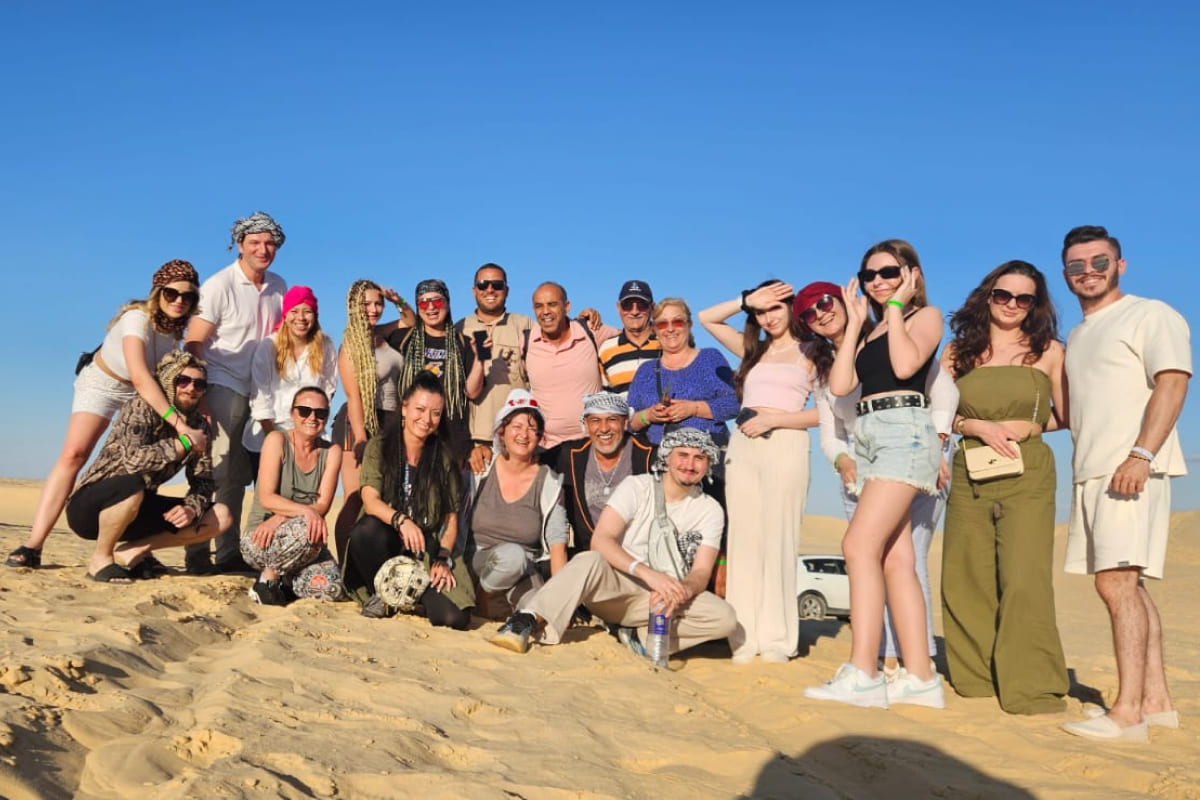
/photo from Andrea Aleksandra Nica personal archive/
What do you spend your money on while living in Tunisia? And how do you usually spend your spare time in this country? Where do you like to go?
My income consists of a fixed salary and commissions. Living in Tunisia, I spend money on the internet and drinks. Sometimes on food and also on personal hygiene products, occasionally on some medications. Overall, my expenses are not particularly high.
When I have free time, I enjoy walking on the beach or swimming. I have already visited all the most important, beautiful, and interesting places in Tunisia, traveling from north to south and from west to east for work. I can say that each region has its own beauty.
But if I had to choose, my favorite places, those that I would definitely recommend to our guests, are Sahara and Sidi Bou Said. Also, I would include Althiburos in the «must see» list for tourists. It is another place with a rich and very interesting history.
Was everything in Tunisia as you anticipated? Did your expectations match reality?
Yes. Life and work in Tunisia have been a very pleasant experience for me.
Emilia Ivanova: «Tunisia for me is the Mediterranean Sea, sun, olive groves, delicious food. And, of course, people»
Let’s begin with some general information. Where did you come from to Tunisia, what is your educational background?
I am from Bulgaria, from Varna. I have a technical education and before working in tourism I was a teacher of technical subjects. I speak English and Russian, and I also have a B1 certificate in German. I had the opportunity to work and live in Germany. I speak a little Turkish, French, and Italian.
How did your journey in tourism and hospitality begin?
I started working in hotels at the Golden Sands resort in Varna as a hotel administrator. I also tried working in other positions.
You live and work in a Muslim country now. Are you comfortable here?
Yes. Before coming to Tunisia, I had been to Turkey about 40 times and I am well familiar with Muslim traditions. Therefore, I initially felt at ease in Tunisia. It is a completely safe country.
Back to the topic of foreign language proficiency. At first, I learned to greet people in the local Arabic dialect and now I have learned even more Tunisian words. I already have so many friends here!
What work do you perform? How would you describe your schedule? Is it intense?
I work with Bulgarian tourists as a guide and translator at Carthage Group, currently with those who are vacationing in Djerba. I assist our Tunisian guides in conducting tours.
I start my working day early in the morning. During the season it is a very demanding job. There were times when I had only one full day off in a month.
I am glad that emergencies and unforeseen situations happen very rarely. Although they do occur sometimes. During one of the excursions in Douz, one of our tourists fell off a camel, and I helped him to get to the hospital.
How did you like working with the Carthage Group team?
I was a bit worried about how my stay here would turn out at first. New colleagues in a new country. But from the first moment we met everything went smoothly, without any issues. The team welcomed me very warm, with respect and kindness.
My experience working in the tourism and hospitality sector, along with the support of my colleagues and the friendliness of the locals, helped me easily go through the adaptation period, which could have been challenging under different circumstances.
What do you spend money on in Tunisia? What do you do on your free time?
I buy gifts for my loved ones who live in Bulgaria. Also, something for myself, like cosmetics or fruits. When I have free time, I enjoy watching football, listening to music and going to the beach.
And what about Tunisia with its attractions. Did you find that interesting?
Of course. Sahel, Kairouan, Gabès. I enjoy traveling through this country, getting to know it from different perspectives. Although my heart in Tunisia completely belongs to Hammamet. It’s my favorite.
I would highly recommend tourists to visit the famous Bardo National Museum, which is simply stunning with its gigantic collection of fascinating exhibits. This museum is second in size in Africa, only to the Cairo Museum in Egypt.
It is also a must to go on excursions to El Djem, Dougga and Nabeul, to see the legendary Carthage and breathe in the ancient history on the Byrsa Hill, to enjoy the views of Sahara and the Atlas Mountains, and to visit Tabarka.
Is the indicator of your «Happiness Index» in Tunisia and at Carthage Group positive?
Yes. Tunisia for me is the Mediterranean Sea, sun, olive groves, delicious food. And, of course, people. Locals and my colleagues at Carthage Group.


